Umrah Packages With All Services
Complete Umrah package including airfare, lodging, food, and transportation for a guided journey.
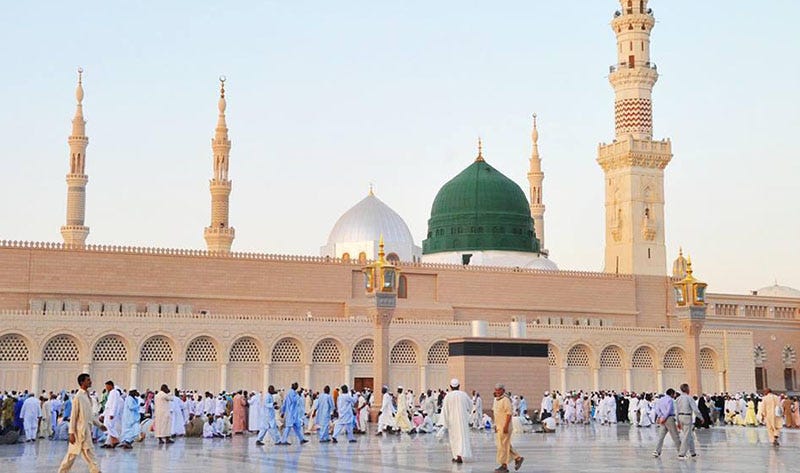
Umrah Package
"It is true that the Makkah mosque was the first house of worship ever built for humanity; it is a holy place and a light to all the worlds." Chapters 96–97 of Surah Al-e-Imran
Nearly two thirds of pilgrims performing the Hajj rituals for the first time were unable to perform them correctly, according to a recent poll. The pilgrims encounter numerous problems as a result of their ignorance, badly written but intelligent publications, and unfamiliarity with places and ceremonial terms. According to Abu Huraira (Radi-Allahu ‘anhu), Allah’s Apostle (Sallallahu ‘Alaihi Wa Sallam) stated: “(The performance of) ‘Umrah is an expiation for the sins committed (between it and the previous one).” The only reward for completing the Hajj Mabrur (the one that Allah has approved) is heaven.Bukhari, Third Vol., No. 1 We at Rahat Travels genuinely understand how important it is for the prospective pilgrim to choose the best package for their needs, as pilgrimage is such an important act of worship. You will find us to be honest and direct in our conversations. We make every effort to recommend the plan that best suits your requirements and provide detailed details of every service that is provided. We give these matters a lot of thought, and after several amazing and successful Umrah trips, we sincerely hope that you will always have kind, accommodating service that exhibits a high degree of professionalism.

skylimit Travels is contracted to...
Skylimit Travels has years of expertise providing excellent Umrah travel services and has partnerships with some of the largest and most reputable Umrah service providers in Saudi Arabia. As such, we are able to provide all Umrah passengers with a reliable and high-quality service from the moment they contact us until they return home. To produce an exceptionally economical package, we take great care in selecting and combining the best hotel alternatives with the best amenities. All of the hotels are near to the Haram. We aim to make this crucial journey as simple as possible for you since we understand how important it is to do Umrah and want to give you the energy you need to focus on Allah’s worship.
Packages
If you would prefer to have the freedom to plan your Umrah vacations anyway you see fit, our bespoke Umrah packages are ideal for you. We can take care of making all the arrangements for you, including hotel reservations and visa applications. From opulent 5-star hotels to reasonably priced 3-star lodgings, we can book a variety of hotels for you.
CHECK OUT: ALL THE INFORMATION YOU NEED TO KNOW ABOUT UMRAHA
Umrah is one of our beloved Prophet Muhammad’s (PBUH) beautiful sunnahs. Compared to the Hajj, this devotional event is shorter and involves fewer procedures.
Now, let us examine the details of this amazing Ibadah performance in more detail. Three primary topics will be covered in our discussion: the significance and advantages of Umrah, the qualifying conditions, and the appropriate method and time for completing Umrah.
A. The merits and significance of Umrah
Opinions on whether or not Umrah must be performed vary. Here, I would like to quote a hadith:
The Prophet (PBUH) was asked if Umrah was necessary, according to Jabir (RA). “No,” he answered. If you do it, though, it’s morally right.
Hadith No. 931, Jami’ At-Tirmidhi, Volume 2, Hajj Chapters.
Some scholars classify this hadith as “Daeef” because they consider it to be weak and feel that undertaking Umrah is mandatory. However, Imam Tirmidhi classifies this narration as “Hasan Sahih” (i.e., fairly authentic).
Imam Shafi asserts that Umrah is a Sunnah from which no one has been known to deviate and that there is no evidence indicating it is merely optional or elective. He continues
Some scholars classify this hadith as “Daeef” because they consider it to be weak and feel that undertaking Umrah is mandatory. However, Imam Tirmidhi classifies this narration as “Hasan Sahih” (i.e., fairly authentic).
Imam Shafi asserts that Umrah is a Sunnah from which no one has been known to deviate and that there is no evidence indicating it is merely optional or elective. He continues by saying that Ibn Abbas (RA) believed it to be essential.
Some scholars place a different emphasis on the significance of Umrah. The “Greater Hajj” (Hajj-al-Akbar) and the “Lesser/Smaller Hajj” (Hajj-al-Asghar), which is the Umrah, are the two names for the Hajj (during the month of Dhul Hijjah).
Regardless of our stance on the matter, there is no denying that Umrah is a magnificent Sunnah, and anyone who is well enough to travel there ought to.
As we have previously stated, Umrah is a beautiful sunnah that is recommended by our beloved Prophet (PBUH) rather than a farz. Let us explore some further information that highlights the significance of performing the umrah.
A1. Sins are pardoned by the Umrah.
According to a narration, Abu Hurairah (RA) stated that Allah’s Messenger (PBUH) declared, “‘Hajj Al-Mabrur’ brings no reward less than Paradise, and from one Umrah to another is expiation for what comes in between.”
(Hadith No. 2888, Hajj Chapters, Sunan Ibn Majah, Vol. 4; Hadith No. 2630, Book of the Rites of Hajj, Sunan An-Nasa’i, Vol. 4).
This story emphasizes the benefits of performing Umrah. When one performs Umrah after another, one’s sins are removed at that time.
A.2. Umrah eradicates destitution.
This is illustrated by the story that follows:
Ibn Abbas (RA) quotes Allah’s Messenger (PBUH) as saying, “Perform Hajj and Umrah consecutively; for they remove poverty and sin like bellows remove impurity from iron.”
Hadith No. 2631, Sunan An-Nasa’i, Volume 3, Hajj Rites Book.
Concurrently completing the Hajj and Umrah does not mean that one should do it always; rather, it just indicates that one should do so occasionally.
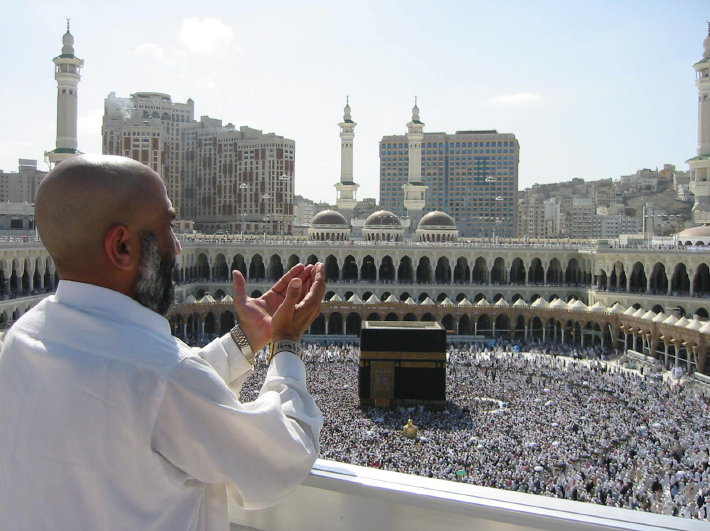
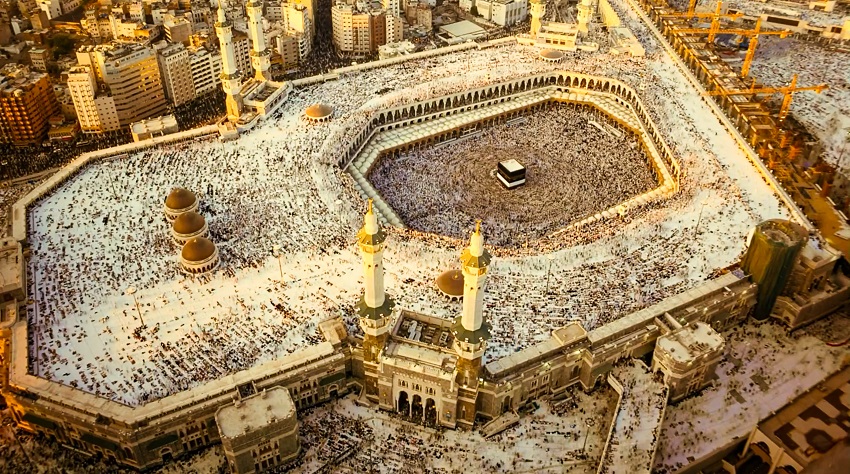
A.3. For some people, Umrah is the same as Jihad.
An narration of Allah’s Messenger (PBUH) states that the saying “Jihad of the elderly, the young, the weak, and the women is Hajj and Umrah” (RA).
Sunan An-Nasa’i, Vol. 3, Book of the Rites of Hajj, Hadith No. 2627.
It follows that performing the Hajj and Umrah is one way that jihad can assist individuals who are unable to fight for Allah’s cause.
A.4. The Umrah performer is a guest of Allah or a representative of Allah.
Please see the following hadith: The Messenger of Allah (PBUH), according to Abu Hurairah (RA), said, “There are three guests of Allah: the Ghazi (a warrior who fights in Jihad), the Hajj (a pilgrim who performs the Hajj), and the Mu’tamir (a pilgrim who performs the Umrah).”
Sunan An-Nasa’i, Vol. 3, Book of the Rites of Hajj, Hadith No. 2626. This is a great honor for the pilgrims because their only reason for traveling is to serve Allah. According to Imam Ibn Majah, there is one more wonderful explanation for the pilgrims’ respect and special status: The Prophet (PBUH) is said to have said, “The pilgrim(s) performing the Hajj and Umrah are a delegation to Allah, as is the one who fights in the cause of Allah,” according to a narrative told by Ibn Umar (RA). In response to His invitation, they expressed their desires, and He complied.
Sunan Ibn Majah, Hadith No. 2893, Chapters on Hajj Rituals, Vol. 4. This narrative claims that these three classes of people are so esteemed that Allah grants their wishes. Another narration (Hadith No. 2892, Chapters on Hajj Rituals, Sunan Ibn Majah, Vol. 4) cites Abu Hurairah (RA) as saying that these three classes of people would receive Allah’s pardon if they requested for it. What an amazing honor it is!
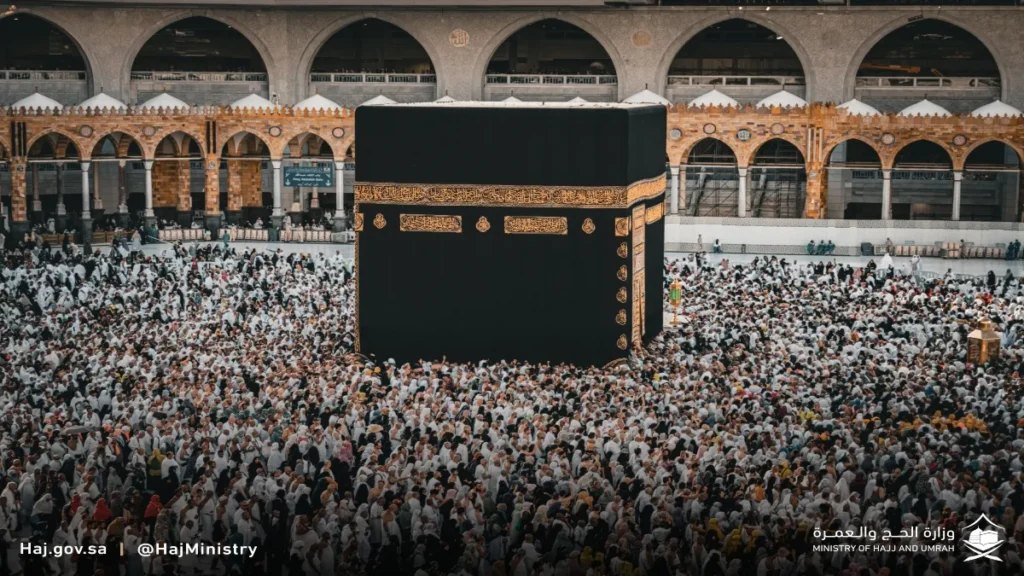
B. Qualification standards
النَّاسِ وَلِلَّهِ حِجَّ الْخَيُاضَ اِيَيَاضَ اِلَيَاضَ عَخِيلاٶ ٹَمَنْ خَفَرَ ٽَإِنَّ اليََهَ أَنََََ أَنََََ أَنٌَََ أَنٌََُ أَنْ الْعٌََاضَََََََََََََََاََُُ
Furthermore, the Hajj to the House (Ka’bah) is a duty that humanity owes to Allah for those who are able to make the journey. Additionally, if someone does not believe, Allah will not require any of the Alamin.
(Surah Aal Imran, Chapter 3, Aayah No. 97, Holy Qur’an).
The verse that was just cited, “And Hajj to the House (Ka’bah) is a duty that mankind owes to Allah, for those who are able to undertake the journey,” naturally raises a problem. What is the requirement to be able to go on the journey?
Let’s rapidly review each of these prerequisites individually:
B.1. The first requirement for an individual is that they need to be financially capable of paying for the trip. There are expenses associated with travel, lodging, and other incidentals, as the Umrah is conducted in Makkah. A person who cannot afford the expenses associated with Umrah is not obliged to perform the Hajj.
B.2. In addition, the person must physically be able to travel, which is the second prerequisite. This is an additional necessary condition, since the pilgrim may experience certain ups and downs (difficulties) along the trip that would be too much for very sick or old people to handle alone. Thus, one needs to be in a state of physical stability in order to make the trip. Nevertheless, these old people may go with a small group of younger people (their sons, for example) who can provide for them along the journey.
B.3. The third requirement for an individual is being debt-free. If there was money due to them by someone else in the past, it should be settled before they go on the vacation. You cannot use borrowed money to complete the Umrah. However, if someone so chooses, they are free to financially sponsor someone else.
B.4. The fourth prerequisite is to use Halal wealth. Because Allah is pure and only accepts pure things, this is very important.
B.5. Additional requirements for women: All of the aforementioned conditions apply to both men and women. But there are certain requirements for women who intend to perform the Umrah. And this need is that in order for a woman to perform Umrah, she requires a Mahram. Kindly refer to the following narration:
A narration attributed to Abdullah bin Umar (RA) states that the Prophet (PBUH) proclaimed, “It is not permissible for a woman who believes in Allah and the ‘Last Day’ to travel for a distance of three nights unless she has a Mahram with her.”
As mentioned in Sahih Muslim, Vol., Hadith No. 3260 (1338).
3. A Mahram is any person of the opposite gender who she is not allowed to marry, including a husband, father, brother, son, maternal uncle, paternal uncle, brother’s son, or sister’s son. Therefore, if a woman does not have a Mahram with her, she cannot conduct Umrah even if she is well and able to pay for the trip.

C. When is the Umrah done?
C.1. Is there a specific time set aside for Umrah prayers annually?
There is no certain time of year that is appropriate for doing umrah. Moreover, there are no limitations on the time of day or night that one can perform Umrah. It is even possible to conduct Umrah in addition to Hajj, like in Hajj-e-Qiran and Hajj-e-Tamattu.
C.2. During Ramadan, the Umrah
If a pilgrim makes Umrah during the month of Ramadan, they will be rewarded extra. The advantage of performing Hajj is equal to the reward of completing Umrah during Ramadan, according to the following hadith.
Umm Ma’qid claims that the Prophet (PBUH) said, “Umrah during Ramadan is equal to Hajj.”
(Jami’ At-Tirmidhi, Hadith No. 939, Vol. 2, Hajj Chapters).
It is crucial to remember that an Umrah done during Ramadan does not relieve someone of their obligation to undertake the Hajj; rather, doing the Hajj just once in a lifetime is a farz that an Umrah done during Ramadan cannot make up for.
C.3. How many times should a person conduct the Umrah in their lifetime?
An individual is permitted to perform Umrah as many times as they like during their lifetime. He or she is permitted to perform the Umrah as frequently as they can afford to. However, there are a few things to think about in this case.
It is best if we follow the example of our beloved Prophet (PBUH). It is therefore ideal that someone perform Umrah as often as the Prophet (PBUH). Please see the following hadith:
“How many times did the Prophet (PBUH) perform Hajj?” I questioned Anas bin Malik. connected to Qatadah. He performed one Hajj and four Umrahs: one from Al-Ji’irranah when he divided the Hunain battle spoils, one from Dhul Qa’dah, one of Al-Hudaibiyah, and one accompanying his Hajj.
(Chapters on the Hajj, Hadith No. 815, Jami’ At-Tirmidhi,
Vol. 2).
Because of this, it is ideal to perform the Umrah four times in a lifetime, as our Prophet (PBUH) did. Nonetheless, this does not prohibit someone from performing the Umrah more than four times. If someone makes fewer than four Umrahs in their lifetime, it does not automatically follow that they have committed a sin.

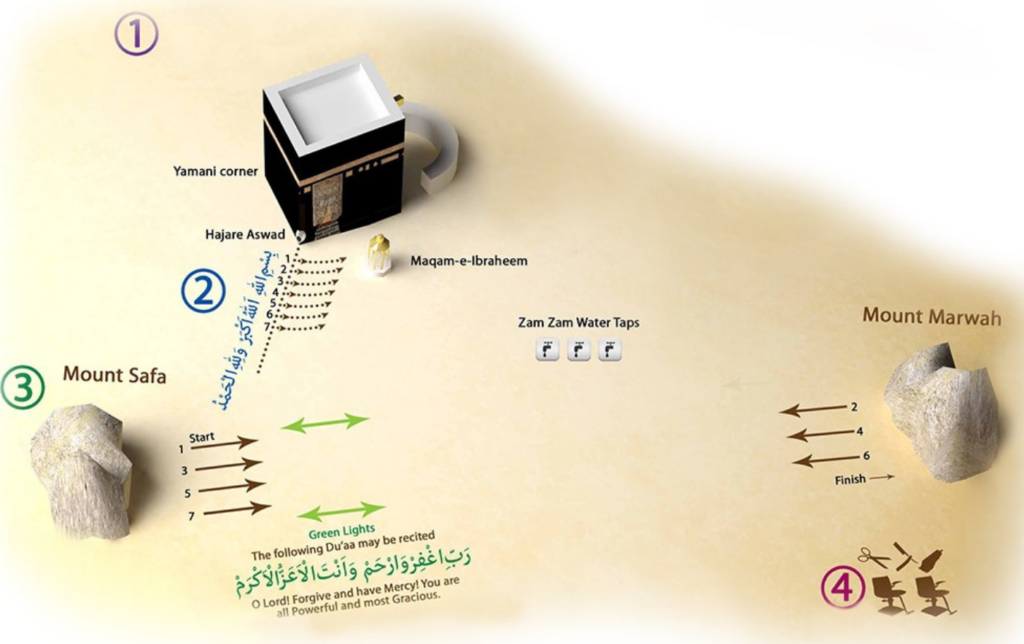
D. How is Umrah performed?
Jabir (RA) said, “The Prophet (PBUH) commanded his companions to complete the ihram and cut their hair short after doing the Umrah and Tawaf (of the Ka’bah, As-Safa, and Al-Marwa).
(Sahih Bukhari, Volume 3, Chapter 11 of the Book of Umrah).
This hadith outlines the processes that must be followed in order to complete Umrah; none of them may be skipped. Based on this narration and other ahadith, all scholars agree that the following is the precise procedure for doing Umrah:
D.1. Entering the state of Ihram (Step 1)
Ihram is the first rite performed during the Umrah. An Umrah is not complete if this is skipped. The intention to conduct the Umrah (and/or Hajj) in a consecrated state is known as Ihram. “Consecration” is designating something or someone as sacred or as someone who is dedicated to a certain purpose. A person who enters the state of Ihram is referred to as a “muhrim.” Once they reach the “Meeqat,” a person who intends to perform the Hajj or Umrah enters the Ihram condition. “Mawaqeet” stands for “Meeqat” in plural form, and these are the Ihram initialization stations. Some places close to Makkah that are reachable by tourists in a variety of ways have been called “Meeqat.” This appointment was made by our beloved Prophet (PBUH). Before traveling outside of these boundaries (the “Mawaqeet”), anyone intending to perform the Umrah (or Hajj) must wear Ihram; if one does so willfully, they must return to the “Meeqat” to obtain Ihram; if not, they must perform a Fidyah, which is the killing of a sheep in Makkah (to be distributed to the needy).
The traveler now gives their Niyyah in order to perform Umrah; Labbaik is the Niyyah for Umrah.
The pilgrims may then start reciting “Talbiyah,” which signifies that they have entered the Ihram state. The term “Talbiyah” is mentioned in the story that follows:
“Labbaik Allahumma labbaik; Labbaik la sharika laka labbaik; Innal-hamda wan-ni’mata laka wal-mulk, la sharika laka,” the Prophet (PBUH) would say, according to Ibn Umar (RA).
Hadith No. 825, Jami’ At-Tirmidhi, Vol. 2, Hajj Chapters. Ihram, “Mawaqeet,” and “Talbiyah” are associated with numerous rules, directives, and dos and don’ts. For all the details, please refer to our previous essay, “Ihram,” which is available at www.quranandhadith.com and goes into great length on these choices.
D.2. Tawaf (Step 2)
The pilgrim proceeds to “Masjid Al-Haram” in Makkah to complete the remaining Umrah ceremonies after meeting the requirements of donning Ihram and reciting the Niyyah. First is the Tawaf of the Ka’bah. The Ka’bah is circled seven times counterclockwise in a process known as tawaf, which is done with the Ka’bah facing left. The round starts and ends at the “Black Stone” corner. After making seven rounds of the house, one should do two raka’at prayers near “Maqam-e-Ibrahim,” the name of the stone (or spot) where Ibrahim (AS) is said to have stood during the building of the Ka’bah. While it is customary to pray near “Maqam-e-Ibrahim” for Tawaf, if congestion or other reasons prevent one from doing so, they are free to worship elsewhere in the sacred mosque.
D.3. Sa’ee (Step 3)
Once Tawaf is completed, the pilgrim does Sa’ee, the next Umrah ceremony. Sa’ee is the term for traveling back and forth between the As-Safa and Al-Marwa mountains, which are located close to the Ka’bah.
D.4. Cutting the hair (Step 4)
Following the completion of the Sa’ee, the pilgrim cuts their hair. The Umrah-related hair-cutting rite is governed by certain laws.
D.4.1: A male tourist has the option of shaving or cutting his hair. This is illustrated by the story that follows:
According to a tale related by Nafi, Abdullah allegedly said, “Allah’s Messenger (PBUH) shaved his head, as did a number of his companions, and some of them cut their hair.” According to Abdullah, “May Allah have mercy on those who cut their hair and those who shaved their heads once or twice.” The Messenger of Allah said this (PBUH).
Hadith No. 3144 (1301), Book of Hajj, Sahih Muslim, Vol. 3.
However, the story linked below provides further information that should be included to this conclusion.
Yahya bin Al-Hussain’s grandmother recounted seeing the Prophet (PBUH) offer prayers for those who had shaved their heads three times and for those who had cropped their hair once on the Farewell Pilgrimage.
As stated in Hadith No. 3150 (1303), Sahih Muslim, Volume 3, Hajj Book.
As a result, shaving the head is increasingly preferred and suggested for male pilgrims. After shaving his own head, the Prophet (PBUH) prayed more for those who had also gone bald. This suggests that shaving was the Prophet’s (PBUH) preferred method of hair cutting.
D.4.2: A female pilgrim is not permitted to shave her head; instead, she should just clip her hair. This is illustrated by the story that follows:
Ibn Abbas (RA) reported that Umm Uthman bint Abi Sufyan testified that Allah’s Messenger (PBUH) said that women should only cut their hair, not shave.
(Sunan Abu Dawud, Book of the Rites of Umrah and Hajj, Vol. 2, Ahadith Nos. 1984 and 1985).
Consequently, a woman cuts a finger-width piece of hair from her head.
With the completion of the Umrah ceremonies, the pilgrim can now don their Ihram. Following this, all of Ihram’s prohibitions are lifted. Concluding remarks Salutations, brothers and sisters. Umrah should only be done for Allah’s honor; it should not be done to attract attention from the public, to achieve material wealth, or to garner respect from others. It is obligatory for all Muslims (with the means to do so), thus one shouldn’t avoid it. I want to emphasize one more thing in this context. There are pilgrims who try to do as many Umrahs as possible on their one trip to Makkah. It is crucial to remember that completing the rituals by themselves does not signify the conclusion of Umrah; rather, it is the pilgrim’s full trip, conquering all obstacles along the way and offering the Ibadah in accordance with Allah’s will. Therefore, it is normally better to perform one Umrah at a time, or in a single trip, rather than performing many Umrahs on a single visit to Makkah. Then, the next time, one should embark on another journey to perform another Umrah. This will therefore give the pilgrim a true understanding of what it means to journey to Allah’s abode. This will provide a fresh and genuine viewpoint for his or her Ibadah during the pilgrimage.
Here are some more guidelines for Muslims who have performed many Umrahs and are still permitted to visit Allah's House:
In order to guarantee that every Muslim worldwide has an equal opportunity to gain from Umrah, these people could decide on a different strategy. Because they lack the resources to do so, many impoverished individuals pass away with the hope and desire to conduct Umrah (and/or Hajj) buried deep inside them. Rich people who have been blessed by Allah should feel obligated to sponsor these underprivileged people so they can perform Umrah (and/or Hajj); they should provide them with the money, the knowledge, and all other resources that they will need to perform Umrah (and/or Hajj). Almighty Allah will bestow upon them an honor, subhanallah.
Allah is the most knowledgeable.
May Allah forgive me if I am wrong and guide us in the right direction. Ameen.
Contact
- Mohammed iqbal:
+91 9160584763 - Mohammed Azhar:
+91 6305444694 Mon-Sat : 11:30 AM – 09:00 PM Sun : Closed
